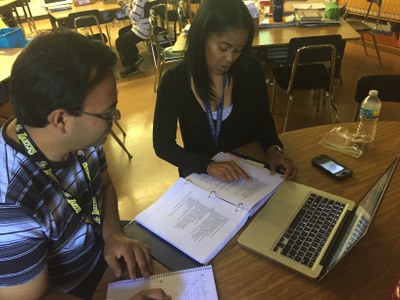Project #4: Mentor Teacher
Overview
A mentor’s overall role is to promote the growth and development of the new teachers to improve student learning and orient them to the school community and teaching in general.
My role as a Mentor Teacher

Fifty-Second Street School begun the 2014-2015 school year with nine teachers who were either new to the field of teaching or new to the school but not new to teaching. Although these teachers agreed to participate in Community of Learners, they needed additional support other than bi-monthly meetings. I volunteered to mentor two of the nine teachers. Prior to their return to LAUSD one of them taught in LAUSD for 10 years and took her talents to a charter and private school for a total of 4 years. My other mentee also taught for ten years in LAUSD, left, and returned five years later.
As a mentor teacher I analyzed the needs of the teachers for the purpose of developing materials that will support and enhance the teachers in various aspects i.e. classroom management, delivery of instruction, and/or evaluating student performance. I supported and guided teachers in planning, instruction, and content knowledge. I demonstrated a range of cognitive coaching competencies, such as posing carefully constructed questions to stimulate reflection, paraphrasing, probing, using wait-time, and collecting and using data to improve teaching and learning. I maintained simple logs that documented formal and informal conferences along with other professional development activities. Through the modeling of a lesson, I demonstrated teaching techniques for the purpose of providing effective strategies to improve classroom management and student success. Because we were in the implementation year of Common Core State Standards, which was challenging even for veteran teachers, it became imperative that I serve as collegial and emotional supports for this challenging phase of a teacher’s career.
Although both teachers had different needs, they thought checking in twice a week and formally meeting twice a month would warrant enough support. At the beginning of the school year, I checked in with them once a day to ensure they had necessary materials and understood policies and procedures to start off the school year on a positive note. I provided enormous support in implementing Close reading, or as we call it at our school “the reading process” and building academic language across content areas. By the middle of the year the meetings occurred as initially stated. During this time Ms. R shared, “I totally understand the reading process. My meaning making of the process allows me to teach it to students in a way that makes sense to them”. Mr. L, who had a challenging class, implemented the routines we discussed through role play and was consistent every time he used them, shared he experienced an overall positive shift in students’ behavior.
Reflection
Learning takes place by sharing, listening, and learning takes by doing. The process of being a mentor allows me to take on the role as a leader when sharing knowledge and best practices. It also places me in the role as a learner as I consider questions posed during the information shared and the different perspectives around best pedagogical practices. It wanted to convey to my mentees that I was just as much as a learner in this process as they were. Most importantly, I didn’t want to be viewed as the vessel with all the knowledge and power. To the best of my ability, I wanted to convey that mentoring is a process that is grounded in guidance and support all to better ourselves as educators and provide optimum educational trajectories for all students.
Two lesson emerged from being a mentor teacher. I learned the support needed and provided is as equally as important as the guidance component. Although both mentees had teaching experiences, there were a lot of changes in curriculum, state standards, and school and district expectations and policies while they were away to the point where it became quite overwhelming at times. Just being there providing a ear to listen and words of encouragement was enough to get them back into track.
The last lesson I learned is that you cannot quantify how many times a person will need guidance or support during the process. There was a times when the need for guidance and support was high and then there were times when it was low. I just reassured them that I was available anytime there was a need not just at our scheduled meetings.
Vocabulary Gallery Walk Overview
CAPE’s Addressed:
CAPE 5: Promoting Implementation of K-12 standards, Pedagogical Skills, Effective Instructional Practices and Student Assessments for Content Instruction by providing support grounded in Common Core State Standards and ensure teachers are using best practice to meet the needs of students.
CAPE 6: Evaluating, Analyzing and Providing Feedback on the effectiveness of Classroom Instruction to Promote Student Learning and Teacher Professional Growth by analyzing and evaluate student work and teachers' verbal reflections.
CAPE 7: Demonstrating Understanding of the School and Community Context, including the Instructional Implications of Cultural/Linguistic, Socioeconomic, and Political Factors by sharing pedagogical skill that best meets the needs of all schools regardless or their culture or socioeconomic status.
CAPE 14: Helping the Teachers Improve their Individual Professional Practice Through Professional Growth Activities by providing collective collaborative opportunities for teachers to share best practices.

